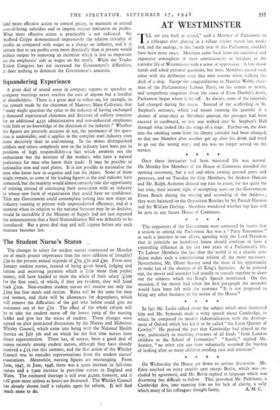Squandering Experience
A great deal of sound sense in company reports or speeches at company meetings never reaches the ears ef anyone but a handful of shareholders. There is a great deal to reflect on, for example, in the remark made by the chairman of Manvers Main Collieries, that "many might question the value to the industry of having exchanged a thousand experienced chairmen and directors of colliery concerns for an additional 4,535 administrative and non-industrial employees with little or no knowledge of the direction of the industry." Whether the figures are precisely accurate or not, the pertinence of the ques- tion is undeniable, and it applies to the complex steel industry even more decisively than to coal-mining. In the mines distinguished soldiers and others completely new to the industry have been put in positions of high responsibility—a fact which awakens not the enthusiasm but the mistrust of the workers, who have a natural preference for men who know their trade. It may be possible to nationalise iron and steel plants. It is not possible to nationalise the men who know how to organise and run the plants. Some of them might remain, as some of the leading figures in the coal industry have remained, but the majority would almost certainly take the opportunity of retiring instead of continuing their association with an industry in whose new form of organisation they could have no confidence. That any Government could contemplate jerking into new shape an industry running at present with unprecedented efficiency, and at a moment when its relation to the national fortunes may be so decisive, would be incredible if the Minister of Supply had not just repeated the announcement that a Steel Nationalisation Bill was definitely to be introduced. But a great deal may and will happen before any such measure becomes law.


































 Previous page
Previous page